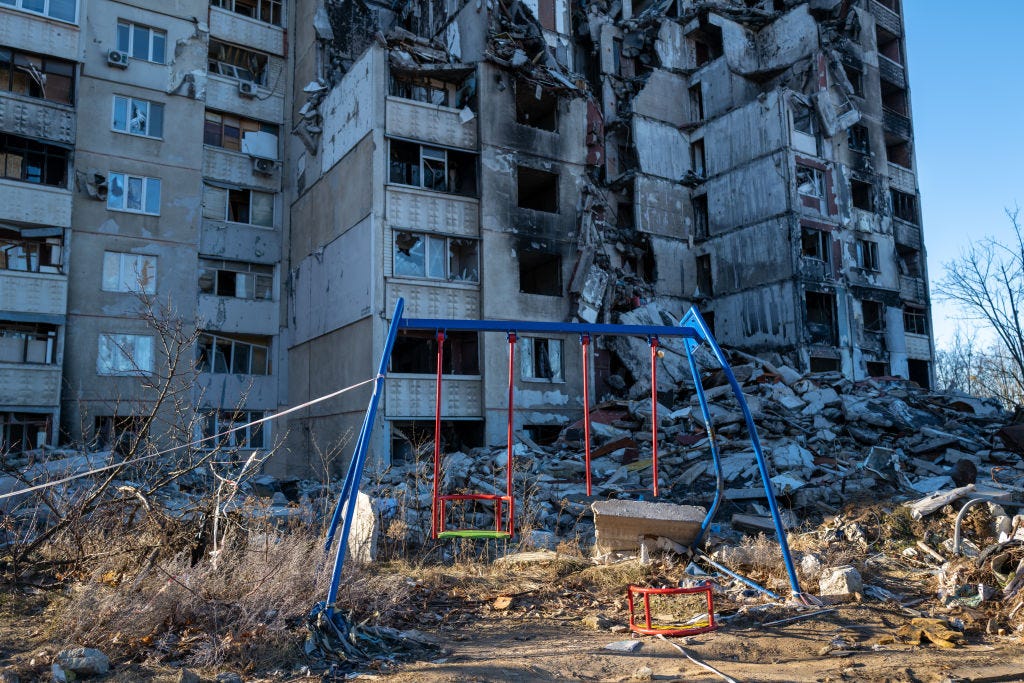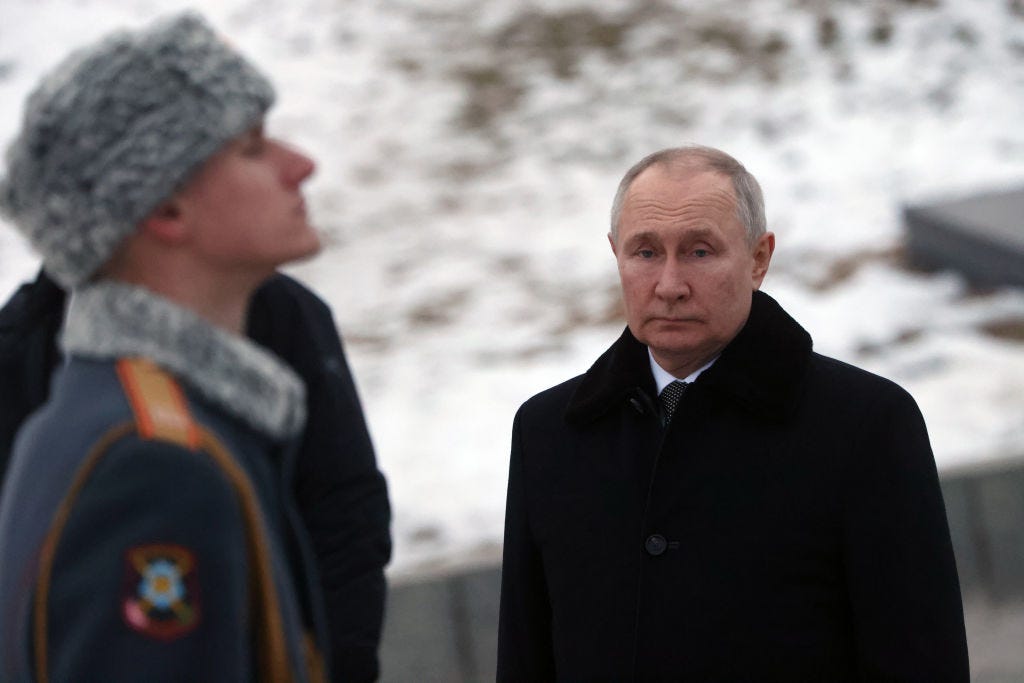By Bradley S. Klein and Scott G. Nelson
One year of war. Upwards of 200,000 soldiers killed on both sides. Mounting civilian casualties. Mass kidnappings.
Russia’s deliberate targeting of Ukrainian hospitals, schools, and apartment buildings is reminiscent of the wars in Yugoslavia in the early 1990s. In the last several months an outright Russian terror campaign has targeted dense population centers, energy infrastructure, and critical health service facilities.
Ukraine’s economy has been diminished by nearly one half. Russia’s international isolation among major powers (save China and India) is now all but assured for at least the next decade. The war will likely drag on throughout this year and well into the next. Peace negotiations are not remotely on the table.
When Putin’s army unleashed its blitzkrieg a year ago, most analysts expected a quick capitulation by Volodymr Zelenskyy’s government. A country with eight times the Gross Domestic Product, 10 times the military budget, and three times the population of its neighbor was not supposed to find itself bogged down in a quagmire from the start.
But just two months into the assault, it became evident that Russia’s military was making grave strategic mistakes, with leaders proving incapable of changing course. As munitions were spent down and spare parts depleted, Russia’s military threw at the conflict the only resource it has in abundance — tens of thousands of young men, so-called “irregulars,” among them Russian convicts, recruited by the Wagner mercenary group run by one of Putin’s trusted oligarchs, Yevgeny Prigozhin.

Ukraine, on the other hand, has demonstrated brilliant strategic planning and superior tactical agility, in many cases fending off the enemy and — as evidenced last fall —even engaging in large-scale offensive operations, pushing Russian soldiers out of territory in the Northeast. What’s more, in its post-Cold War existence, Ukrainian national identity has never been stronger or more resolute in affirming its commitment to the country’s independence.
It’s now evident that Putin’s greatest strategic blunder is not that his plan to crush Ukraine’s government and annex the country has failed. Rather, it is that he has backed into a conflict that now has enormous existential stakes — for Ukraine, certainly, and also for Russia. The stakes are very real, too, for the West.
Public Notice is entirely funded by readers and made possible by paid subscribers. To support this work, please click the button below and sign up to get our coverage of politics and media directly in your inbox three times a week.
Putin turns Russia into a pariah
Russia’s isolation among countries capable of inflicting the most pain on its economy through sanctions could last for decades, condemning it to the status of a minor power with major structural weaknesses, and a nearly complete hollowing out of its middle and technical classes (its human capital).
It will be an unpredictable and potentially self-destabilizing state on Europe’s eastern flank. By invading Ukraine, it has sided with the small, economically weak nations of Eurasia which are now, understandably, reassessing their allegiances. Dreams of a great Eurasian economic and political union over which Russia would preside were never realistic; now they are dashed completely, creating a vacuum China is more than happy to fill. Meanwhile, Russia loses young people not only in the war, but to emigration, and at an astonishing rate.

Then there is the significance of an historically unprecedented geopolitical realignment, a blowback that Putin was not anticipating but which his actions have unquestionably provoked. The West is fortunate that its foreign policy toward Russia enjoys the support of international law, including the UN Charter (1945) which enshrines state sovereignty, permits the formation of alliances, and protects arms transfers among allies should military aid be needed. These and other binding treaties were upheld by the Helsinki Accords of 1975.
The Soviet Union was signatory to both the UN Charter and the Helsinki Accords; the Russian Federation is the successor state that inherited the legacies of international treaty obligations. Thus far, Brussels and Washington have been in lockstep behind Ukraine’s basic approach, even if they have differed at times on particular categories of (offensive) weapons systems that court the very real danger of escalation. But lines of interest and loyalty are clearer now than they have been in decades.
Europe’s mild winter has softened the burden of an otherwise abrupt shift away from Russian oil and gas, allowing nations to cultivate other suppliers. Meanwhile, the transition to clean energy has been hastened in Western Europe, which will steadily reduce the leverage global energy producers exercise over energy importing countries.
In stark contrast to the resolute Euro-Atlantic alliance, Chinese President Xi Jinping and Indian Prime Minister Narendra Modi continue to dither on the biggest questions, serving up their economies as markets for Russian exports as they lose the support of key economic partners and political allies. They appear to have been biding their time, playing both sides at once and in so doing weakening their own position at home and abroad. Neutrality in international relations is a chimera. The wait-and-see attitude of both China and India can only be interpreted as siding with Russia and against Ukrainian sovereignty, and against human dignity.
And Russia’s ability to persevere? As crippling sanctions were introduced, Russia stopped publishing a broad range of economic indicators. Analysts predict that taxes will be raised and production resources will increasingly be devoted to defense industries, further squeezing the consumer sector in a replay of the “heavy industry” approach to steel production that contributed to the collapse of the USSR.
The endgame of the war remains unclear. As it grinds on, the Western alliance will be tested, certainly as the costs of supporting Ukraine continue to mount. Republican politicians’ calls for withdrawing American support for Ukraine should be met with stern warnings about the fate of that most perilous course of action.

Indeed, Americans should more carefully consider what lies on the other side of Putin’s treachery — relative to Ukraine, and also relative to his own country. Inviolable sovereignty, international law, diplomatic initiatives oriented toward securing peace and stability — these measures are designed to keep nations from one another’s throats.
Americans should also ask what Putin’s brutality in Ukraine as well as in Russia means for our country at this critical political juncture.
Freedom versus unfreedom
In his book The Road to Unfreedom (2018), Yale historian Timothy Snyder suggested that Russia — whose population has all but succumbed to the will of one man — is just a step or two ahead of the US and Europe in terms of the onset of an illiberal, anti-democratic predicament, perhaps the most fatal danger a nation will face. The persistence of massive inequality, the steady encroachment of propaganda on political discourse, the erosion of civic responsibility among the citizenry, and the inducements of an us vs. them mentality — these and other authoritarian developments are not unique to Russian political culture or to those of the greater Eurasian world. They are eternal risks for any democracy.
Are Americans capable of seeing themselves more clearly in the shadow of Putin’s war? Putin was probably not so deluded to think that he had the power to significantly weaken the West by anything he did alone. Well before the invasion last February, he thought he could imperil the West by goading it on in what he saw as its own self-induced debasement. It is now increasingly evident that Putin collaborated with Donald Trump and other would-be authoritarians in Europe in numerous campaigns, encouraging political forces that took aim at institutional safeguards and promoted exactly the wrong cultural attitudes a democracy must cultivate.
As the war has progressed, Russia historian Stephen Kotkin has emphasized that key distinctions between liberal and illiberal societies have become all the sharper. Liberal and Western are not geographic concepts, but institutional and values concepts. They mean rule-of-law societies, those that come with the usual provisions that should still mean something — institutions that ensure the rule of law, division of power, checks and balances, property rights, and free and open media ecosystems (however flawed). They also come with political cultures devoted to protecting institutional provisions for the long haul — an increasingly open question in some Western-leaning countries.
In times of great uncertainty, it is instructive to consult those rare guides who have offered sage advice in earlier eras. The Russia expert George Kennan is one such resource.
In his famous mid-20th century article about the Soviet Union titled “The Sources of Soviet Conduct,” Kennan stressed the need for a policy of containment designed “to confront the Russians with unalterable counterforce at every point where they show signs of encroaching upon the interest of a peaceful and stable world.” The Berlin Airlift, diplomatic and economic pressure applied to the USSR after Hungary (1956), Czechoslovakia (1968) and Afghanistan (1979) were, on this view, intelligent, strategically-oriented applications of the policy. Kennan, however, was not an uncritical proponent of containment. He argued strenuously that the civil war in Vietnam, for example, was a conflict the US should not have been involved in.
But Kennan knew that confronting Soviet power also required asking hard questions of ourselves. Heading into what would become the Cold War, Americans had, Kennan argued, considerable work to do on the home front. The United States needed to “create among the peoples of the world generally the impression of a country which knows what it wants, which is coping successfully with the problems of its internal life and with the responsibilities of a world power, and which has a spiritual vitality capable of holding its own among the major ideological currents of the time.”
In a time when liberalism is seen by many as weak and irresolute, and autocracy is presented as the answer to slow, plodding institutions, we would do well to consider the example that the West's political vision still sets for people the world over, and can continue to set. That is now being put to the test in Ukraine.
The Tucker Carlson text that stuck with me
By Aaron Rupar
I wasn’t surprised by the release of internal Fox News correspondence late last week showing hosts didn’t believe the lies about the 2020 election they pushed on their shows. As longtime readers might remember, over a year ago I extensively covered tranches of texts and emails released by the January 6 committee that revealed the same thing, so the overarching theme isn’t new.
There is one newly released text message that surprised me, however. That’s because it shows Tucker Carlson calling for the head of one of the network’s most effective reporters.








